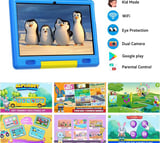
The Impact of Tablets on Early Childhood Education
11/15/20243 min read

In recent years, tablets have revolutionized early childhood education, offering a dynamic and interactive learning experience that traditional methods often lack. The integration of tablets in educational settings has brought about numerous benefits, enhancing both the teaching and learning processes. Below, we explore the positive impacts of tablets on early childhood education, highlighting key reasons why they have become an essential tool in classrooms.
Enhancing Engagement and Motivation
One of the most significant advantages of using tablets in early education is their ability to engage young learners. Tablets offer interactive and visually appealing content that captures the attention of children, making learning more enjoyable and motivating. Educational apps and games on tablets encourage active participation, which is crucial for effective learning in early childhood.
Personalized Learning Experience
Tablets provide a personalized learning experience, catering to the individual needs of each child. Adaptive learning apps adjust to a child's learning pace, offering challenges that are tailored to their skill level. This customization helps prevent frustration and boredom, allowing children to progress at their own speed and ensuring a more effective learning process.
Developing Technological Proficiency
Incorporating tablets into early childhood education helps children develop technological skills from a young age. As technology continues to be an integral part of our daily lives, early exposure to tablets ensures that children become comfortable with digital tools. This early familiarity sets a foundation for future technological proficiency, preparing them for a tech-driven world.
Encouraging Creativity and Critical Thinking
Tablets offer a platform for children to express their creativity and enhance their critical thinking skills. Drawing apps, storytelling tools, and puzzle games stimulate creativity, allowing children to explore their imagination. Additionally, problem-solving apps encourage critical thinking, helping children develop essential cognitive skills.
Facilitating Inclusive Education
Tablets play a crucial role in making education more inclusive. They provide access to a variety of learning resources that accommodate different learning styles and abilities. For children with special needs, tablets can be equipped with apps specifically designed to support their learning requirements, ensuring that all students have the opportunity to succeed.
Strengthening Communication Skills
Many educational apps focus on language development and communication skills. Tablets offer interactive stories, vocabulary games, and language exercises that help children improve their reading, writing, and speaking abilities. By engaging with these apps, children can enhance their language skills in a fun and interactive way.
Supporting Teachers and Parents
Tablets not only benefit children but also support teachers and parents. They offer a wealth of resources and tools for lesson planning and assessment. Teachers can track a child's progress through educational apps, identifying areas where additional support is needed. Parents can also participate in their child's learning journey, using tablets to reinforce concepts learned in school.
Incorporating tablets into early childhood education presents numerous benefits that enhance the learning experience for young children. From increasing engagement and motivation to supporting personalized learning and inclusive education, tablets are a powerful tool in modern classrooms. As technology continues to evolve, embracing these digital advancements will ensure that children are equipped with the skills they need for future success.












Explore
Engaging tips for kids and tablet usage.
Learn
Play
123-456-7890
© 2024. All rights reserved.
